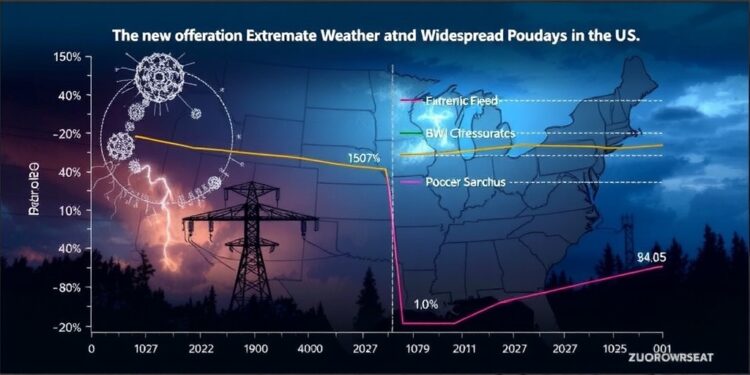The interplay between severe weather phenomena and power outages is a poignant reminder of the vulnerabilities within our modern infrastructure, particularly as climate change accelerates the frequency and intensity of various weather events. In a groundbreaking study spearheaded by a distinguished researcher at the Columbia University Mailman School of Public Health, the intricate relationship between these two occurrences has been meticulously explored. The findings, published in the open-access journal PLOS Climate, highlight the pressing need for enhanced hazard response strategies to mitigate the risks associated with disruptions in electrical supply during extreme weather events.
Across the United States, severe weather events have been shown to precipitate large-scale power outages, leading to significant socioeconomic repercussions. These outages can have dire implications, particularly in times when power is essential for the operation of medical equipment, heating, air conditioning, and other critical services. The ongoing climate crisis serves to exacerbate these challenges, as it increases both the severity and frequency of severe weather events, necessitating a better understanding of the patterns and distributions of power outages to inform community preparedness and resource management.
The research highlighted that power outages were most frequently linked to severe precipitation and extreme heat, revealing significant regional disparities in the distribution of these outages. For instance, counties in the Northeast U.S. were more prone to precipitation-related outages, whereas heat-related outages were predominantly observed in the Southeast. Additionally, the researchers noted a growing trend of co-occurring outages and wildfires along the West Coast, marking a worrying development that raises important questions about the management of electrical grids in wildfire-prone areas.
Despite the insightful findings presented by Do and her colleagues, it is important to acknowledge the limitations in the data. In particular, reliable data was not uniformly available for all counties, creating gaps in information that left regions such as the Southwest and Mountain West less represented in the study. In light of these limitations, the authors advocate for further research that can provide additional data, as well as realistic simulations of severe weather combinations across diverse geographies, to enhance the capability of municipalities to construct effective mitigation and response strategies.
The implications of this research extend beyond merely identifying problem areas; they delve into the broader societal importance of understanding the interdependencies between infrastructure and environmental factors. In an era when the electrical grid is becoming increasingly antiquated, and as severe weather continues to pose escalating threats, strategies that preemptively address the intersection of severe weather challenges and power failures are crucial. The careful mapping of outage patterns, as highlighted in this study, is fundamental for designing robust systems geared toward minimizing public health risks and economic losses.
Furthermore, as climate models predict increasingly dramatic shifts in weather patterns, researchers and policymakers must work in tandem to preemptively address the vulnerabilities associated with energy dependence. These insights could be incorporated into future revisions of national response frameworks, ensuring that contingencies are established to protect critical infrastructure in times of weather-related crises. This can also enhance public awareness and preparedness initiatives, ensuring that communities are equipped to handle power loss and its cascading effects.
The study received financial backing from several prominent institutions, including the National Institute for Environmental Health Sciences and the National Institute on Aging, underscoring the broad interest in understanding the health impacts of environmental hazards. Importantly, the funding bodies had no direct influence over the study’s design, data collection, or the conclusions drawn, thereby ensuring the integrity of the research process.
As climate change continues to reshape the landscape, studies such as this one serve as crucial tools for informing public health policies, energy conservation measures, and community resilience planning. The convergence of severe weather events and power outages is not merely an infrastructure issue; it encapsulates broader societal challenges, including equity in public health and the necessity for robust disaster preparedness systems.
As communities across the U.S. grapple with these evolving threats, the findings of this research underscore the imperative of a collective response to strengthen resilience against the dual challenges posed by climate change and electrical grid vulnerabilities. This holistic approach will be essential for safeguarding public health, ensuring equitable access to vital services, and reinforcing the electric grid against the increased strains brought on by an unpredictable climate.
In conclusion, understanding the shifting relationship between severe weather and power outages is not only a scholarly endeavor but a fundamental necessity for fostering community health and safety in an era where extreme weather becomes the norm rather than the exception. The integration of science-informed strategies into community planning will be essential for minimizing disruption and safeguarding the well-being of populations at risk.
Subject of Research: Relationship between severe weather events and power outages.
Article Title: Spatiotemporal patterns of individual and multiple simultaneous severe weather events co-occurring with power outages in the United States.
News Publication Date: 22-Jan-2025.
Web References: PLOS Climate
References: Not provided.
Image Credits: Not provided.
Keywords: Climate data, Environmental health, Electrical power generation, Weather.
Tags: climate changedisaster preparednessenvironmental healthextreme weather eventsgrid resilienceheatwavesinfrastructure vulnerabilitypower outagesregional disparitiessocioeconomic impactspatiotemporal patternswildfires





